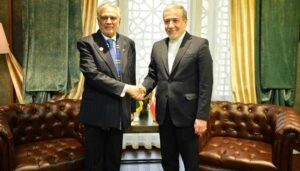Pakistan and Palestine Sign MoU to Boost Health Sector Cooperation

Islamabad, The Gulf Observer: Pakistan and Palestine on Wednesday signed a Memorandum of Understanding (MoU) to strengthen collaboration in the health sector, the Ministry of National Health Services announced.
The agreement was signed by Pakistan’s Federal Minister for Health, Syed Mustafa Kamal, and the Palestinian Ambassador in Islamabad, representing their respective governments.
According to the ministry, the MoU aims to enhance cooperation in advanced medical fields, professional training, and joint research, creating long-term opportunities to strengthen healthcare systems in both nations. A Pakistan–Palestine Health Working Group will be established within 30 days to oversee implementation and ensure the success of the agreed initiatives.
The scope of collaboration includes interventional cardiology, organ transplants, orthopedic surgery, endoscopic ultrasound, burn treatment, and plastic surgery. Pakistan will also provide expertise in infectious diseases, ophthalmology, pharmaceuticals, and collaborative medical research. Training opportunities for Palestinian health professionals at Pakistan’s premier institutions are part of the plan.
“The purpose of this agreement is to foster closer collaboration for improving the health and well-being of the people of both brotherly nations,” Minister Kamal said. “The hearts of the people of Pakistan beat with Palestine, and we stand ready to assist our Palestinian brothers and sisters in every possible way.”
The Palestinian Ambassador welcomed the initiative and expressed gratitude to Pakistan for its continued support, noting that cooperation now extends beyond political and humanitarian spheres into the critical area of healthcare.
Officials emphasized that the MoU is a practical roadmap, not a symbolic gesture, and is expected to deliver direct benefits to patients and health systems in both countries. The agreement reflects Pakistan’s consistent commitment to supporting Palestine in diverse sectors, with both sides reaffirming their partnership to advance medical science and improve patient care.


